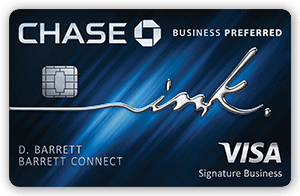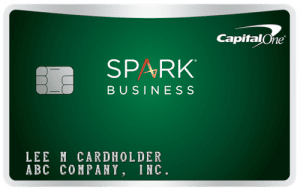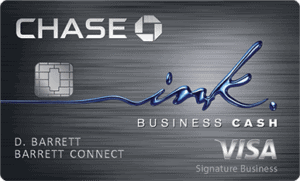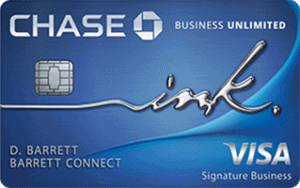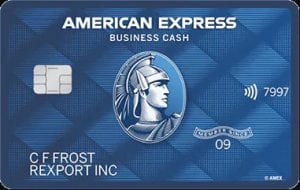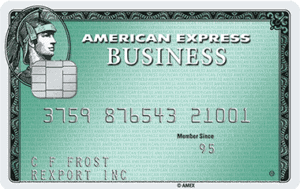What Is A Business Credit Card?
Business credit cards are types of credit lines granted to businesses to pay for everyday expenses. Unlike with traditional lines of credit, borrowers have a grace period before the card issuer starts charging interest on the amount drawn from the line. For this reason, business credit cards can be used to access funds the merchant doesn’t have on hand. Business cards also allow business owners to keep track of business expenses by putting the charges on their credit card.
Credit card issuers offer additional incentives to use the card by offering signup bonuses, rewards for spending, introductory 0% APR periods, or other perks. Diligent business owners can save money by choosing a card that carries rewards programs and other benefits that are suited to their business.
How Is A Business Credit Card Different From A Personal Credit Card?
While personal credit cards are intended for consumers and their everyday expenses, business credit cards are intended for businesses and their expenses. Business credit cards often have higher spending limits than personal cards, rewards or other spending incentives that are more suited for business expenses, and other perks designed to help business owners manage their money.
Types Of Business Credit Cards
All business credit cards are not created equal. Issuers offer a number of different cards, and some will work better for your business than others. Below are the most common types of business credit cards.
Business Rewards Credit Cards
Credit cards with rewards incentives award business owners points for purchases made with their credit card. Points can then be redeemed for rewards such as travel expenses, cash back, gift cards, or statement credits.
As a general rule of thumb, each point is worth $0.01; if you have 1,000 points, you can redeem them for something worth $10. However, business owners who want to extract maximum savings from their card often favor credit cards with rewards points because some rewards can be redeemed for more than the standard $0.01 each. That said, cardholders with a rewards card have to be mindful of how they redeem the points because some redemption methods can be worth less than the standard.
Business Travel Credit Cards
Travel cards are credit cards in which the cardholder can earn and redeem rewards via travel. Travel cards are often offered in partnership with specific airlines or hotels. However, some credit card issuers also offer more generalized travel business credit cards.
Rewards for business travel cards are generally offered as points, sometimes called “miles.” Points can generally be applied to travel expenses such as airfare, car rentals, in-flight amenities, or room upgrades, depending on the card’s rewards program.
Business Cash Back Credit Cards
Cash back cards offer a small percentage of the merchant’s purchases as cash back. For example, the credit card might carry a flat rate of 1.5% cash back; for every charge the merchant makes, they will receive 1.5% of their purchase as cash back.
While some cash back cards carry flat rates, many offer tiered rewards. For example, if your card has tiered rewards, you might receive 3% cash back on spending in some categories, 2% cash back on spending in others, and 1% cash back on all other purchases.
Rewards are normally received in one of two ways: as a check, or as statement credits applied to your account. Note, however, that some cards, although marketed as cash back cards, are actually rewards cards. For example, 3% cash back is actually 3 points per $1 spent. While these cards can be used to receive cash back, you might be able to earn higher value for your points by redeeming them in another way.
Business Charge Cards
Charge cards are similar to business credit cards, but with one important difference: cardholders cannot carry a balance. Instead, you must fully pay off your expenses every period. As such, charge cards do not carry interest or APRs. However, they do carry fees for late payments, which are often more costly than credit card interest charges.
Charge cards carry similar types of rewards as credit cards — you earn points for spending and can redeem points for cash back, travel, or other rewards.
Corporate Credit Cards
Corporate credit cards are special business card arrangements for large businesses, normally businesses with a fair amount of employees that makes at least $4 million in annual revenue. Corporate cards are offered by American Express, Visa, and Mastercard.
Like business credit cards, corporate cards carry grace periods and rewards structures. Corporations also favor them because the business is responsible for the debt (business owners don’t normally have to sign a personal guarantee) and the business might have more bargaining power when settling on card specifics.
Read more about corporate cards in our guide to corporate vs business credit cards.
Benefits & Drawbacks Of Business Credit Cards
Business credit cards are useful tools for most businesses. However, they are not without their downsides. Here are the pros and cons of business credit cards:
Pros:
- Business Savings Via Rewards Or Cash-Back: Issuers offer rewards incentives for putting charges on your credit card. By putting everyday expenses on a credit card, especially one with a strong rewards program that matches your business spending, you could save a fair amount of money.
- Deferred Payments: Need to make some purchases, but don’t have the money right now? Credit cards can be used to defer payments to a more convenient time.
- Track Spending: Businesses have a lot of expenses going in and out. Using a credit card is an easy way to keep track of where all your money is going.
- Enable Employee Spending: Do you have employees that make purchases for your business? Credit card issuers offer employee cards, often at no additional cost. This is an easy and convenient way to enable employee spending.
- Build Credit: If your business credit card issuer reports your activity to the business or personal credit bureaus, you could improve your credit by utilizing your credit card and paying off the balance on time.
Cons:
- Credit Cards Carry High APRs: If you find that you are carrying a balance, either because you cannot afford to pay off the debt, you forgot to pay it, or some other reason, you might find that the interest charges are racking up quickly. Additionally, some credit card issuers charge penalty APRs if you fail to make certain payments, which are higher than standard APRs.
- Expensive Fees: In addition to interest, credit cards can carry fees for actions such as balance transfers, foreign transactions, late payments, spending over your limit, and so on. These fees can add up fast, especially if you aren’t aware that you are incurring them.
- Affect Credit: While credit cards can build your credit if the issuer reports activity to the credit bureaus, they can also have a negative effect on your score if you do not make payments on time.
How To Get A Business Credit Card
Who Are The Major Credit Card Issuers?
Business credit cards are offered by most financial institutions that offer personal credit cards. Popular credit card issuers include:
- Chase Bank
- American Express
- Capital One
- Bank of America
- Wells Fargo
- US Bank
With the exception of American Express, the above issuers partner with either Visa or Mastercard to offer their cards.
Who Can Apply?
Technically, anyone who owns a business can apply for a business credit card. That means that fully fleshed-out operations turning a profit can apply for a card, as well as freelancers or anybody else making money outside of a traditional employment situation.
What You Need To Apply For A Credit Card
Business credit card applications are generally fairly easy to complete, as long as you have a couple of documents ready to look up information. When applying for credit cards, you can expect to enter information such as this:
- Personal and business name
- Personal and business contact info
- Personal income
- Business revenue
- Personal and business outstanding debt
- Industry type
- Time in business
- Business structure
- Number of employees
- Estimated monthly spend
- Social security number (SSN)
- Employer Identification Number (EIN)
- Federal Tax ID
How To Choose Which Credit Card Is Right For Your Business
How To Compare Cards Side By Side
At first glance, deciding on a credit card can be overwhelming, because every card carries different APRs, fees, rewards structures, signup bonuses, and other special offers. Fortunately, when you decide how you are going to use your card, you can narrow down your choices based on what will work best for your situation and which card best matches your business expenses.
Do you want a card to save money and earn rewards? Pay attention to the rewards incentives and signup bonuses, especially to cards that carry rewards for spending in categories that your business spends a lot of money on. For example, if you spend a lot on travel, you might want to consider getting a card with travel rewards.
Do you plan on carrying a balance? Pay attention to the APR, fees, and special 0% introductory periods. If you plan on carrying a balance, low APRs are better, because you will keep your debt lower and more manageable.
Do you want to make a balance transfer? If you are planning on transferring credit card debt from one card to the other, look for cards that have low (or no) balance transfer fees and/or have an introductory 0% APR balance transfer period.
Do you want to make a large purchase? Seek out a card with a long 0% introductory period. While you will still have to pay down part of your balance every statement period, you will be able to carry a balance without incurring any interest charges until the introductory period has ended. This gives you longer to pay off your purchase.
Do you (or your employees) frequently travel outside the US? Look for a card without a foreign transaction fee.
Do you need a credit card for emergencies? If so, rewards, signup bonuses, and other special incentives don’t matter. Instead, look for a card with a low APR.
Do you need a card to build personal credit? Look for a card that reports activity, both good and bad, to the credit bureaus. Most credit cards only report poor activity to credit bureaus, but if you want to build credit you’ll need to find a card that reports all your activity.
Frequently Asked Questions
Can I Use My Business Credit Card For Personal Expenses?
Business credit cards can be used for personal expenses. However, experts generally advise that, unless you are in the early stages of starting your business, you shouldn’t mix personal and business expenses. So, while you can use business cards for your personal expenses, you might be better off keeping a personal card (or even a separate business card) strictly for personal expenses.
What Is Considered A Good Business Credit Score?
Every issuer has their own ideas about what’s considered a “good” score, but in general, a credit score of 670 – 750 is considered “good” to “very good,” and a score of 751 – 850 is considered “excellent.”
To qualify for most business credit cards, you’ll need a credit score in the high 600’s or above. However, some issuers offer secured cards for merchants with low credit. In addition to having access to a credit card, these cards are beneficial because they can help build your credit to a point where you can qualify for top-tier cards.
What Is The Best Small Business Credit Card?
The best small business credit card is dependent on your business. The card that is best for your business will depend on the volume and type of business expenses you have, as well as how you intend to use the card. Your choices might be additionally limited by what credit cards you can qualify for, based on your personal credit score and business profile.
There are a number of quality business credit cards available. With a little searching, you’ll be able to find the best credit card for your business.

